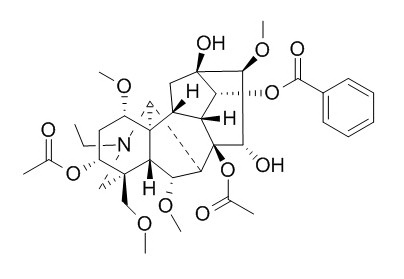Acetylaconitine
3-Acetylaconitine, aconitine, and deoxyaconitine are main toxic components of the roots of Aconitum pendulum.
Inquire / Order:
manager@chemfaces.com
Technical Inquiries:
service@chemfaces.com
Tel:
+86-27-84237783
Fax:
+86-27-84254680
Address:
1 Building, No. 83, CheCheng Rd., Wuhan Economic and Technological Development Zone, Wuhan, Hubei 430056, PRC
Providing storage is as stated on the product vial and the vial is kept tightly sealed, the product can be stored for up to
24 months(2-8C).
Wherever possible, you should prepare and use solutions on the same day. However, if you need to make up stock solutions in advance, we recommend that you store the solution as aliquots in tightly sealed vials at -20C. Generally, these will be useable for up to two weeks. Before use, and prior to opening the vial we recommend that you allow your product to equilibrate to room temperature for at least 1 hour.
Need more advice on solubility, usage and handling? Please email to: service@chemfaces.com
The packaging of the product may have turned upside down during transportation, resulting in the natural compounds adhering to the neck or cap of the vial. take the vial out of its packaging and gently shake to let the compounds fall to the bottom of the vial. for liquid products, centrifuge at 200-500 RPM to gather the liquid at the bottom of the vial. try to avoid loss or contamination during handling.
Turk J Med Sci.2023 53: 1312-1320.
Nat Commun.2021, 12(1):681.
Molecules.2024, 29(23):5792.
Progress In Microbes & Molecular Biology2025, 8,1:a0000470.
Plant Pathology2022, 13527
Front Microbiol.2023, 14:1232039.
Current Pharmaceutical Analysis2017, 13(5)
In Vivo.2022, 36(3):1136-1143.
Journal of Applied Biology & Biotechnology2023,11(4):148-158
Aging (Albany NY).2023, 15(24):15557-15577.
Related and Featured Products
Zhongguo Zhong Yao Za Zhi. 2010 Mar;35(5):588-92.
Study on processing principle of Aconitum pendulum.[Pubmed:
20506817]
To study the processing principles of different processed products of Aconitum pendulum.
METHODS AND RESULTS:
Using high performance liquid chromatography and acute toxicity test to compare the changes in chemical composition and toxicity of the roots and processed products of A. pendulum. The main toxic components of the roots of A. pendulum were aconitine, deoxyaconitine and 3-Acetylaconitine. The contents of these three alkaloids were significantly reduced in processed products, while benzoylaconitine significantly increased. In addition, processed products emerged aconine, polyschistine-D, beyzoyldeoxyaconine, 16-epi-pyroaconitine and 16-epi-pyrodeoxyaconitine. From the structural analysis, these new emerged compounds transformed from the aconitine, deoxyaconitine and 3-Acetylaconitine.
CONCLUSIONS:
Different processing methods can reduce the toxicity of the roots of A. pendulum. Processing principle is ester hydrolysis and high-temperature pyrolysis.



